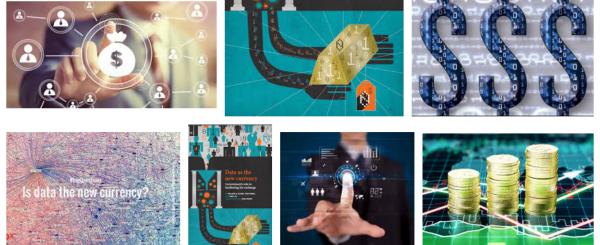Limits and risks of "data as money"
In May 2018 (*), while discussing alternatives to Facebook and similar services, I also criticized the whole general idea of "using one’s own data as a currency".
Those critics came out as a reaction to these arguments:
- “If Facebook were a user cooperative, it should provide itself not only with a democratic government, but also with a control system that ensures the democratic nature of the government”
- “Each user of that cooperative should be able to “sell” her data to those who wanted to use them (such as banks or insurance) to offer personalized services”
Anything that will replace Facebook will certainly NOT democratic, or accountable, by being a cooperative. Transforming anything like Facebook in a cooperative, or “breaking it up” is half impossible, half useless. Trust me on this: seriously, it’s a dead end. On using personal data “as currency” instead, color me doubtful. VERY doubtful.
Why “data as money” is very likely a BAD idea

Rights as services for sale
Generally speaking, the whole line of thought of "using one’s own data as a currency" sounds intrinsically bad to me. Because it reduces to sales and marketing what should be a right, that is access to essential online services, and above all to communication (that is, eventually, to freedom of speech). To me, “selling one’s data” sounds just a little bit too much like going from exploitation of prostitution to self-managed prostitution, just universal and, in fact, mandatory for all.
Minors**
What should minors sell? Could they sell their own data in the first place?
Economic discrimination**
If access to personalized services is paid by selling one’s data, those who have less to sell will likely have less, or lower quality services. But often, those with more data to sell will just be, AGAIN, only those with more money and purchasing power. Think rewarding people because they share product reviews, or “sell” their data about how they use some product: sounds good, until you realize that you are rewarding who has more money to buy more stuff, and use it more (i.e. also polluting more, in many cases)
Access discrimination**
That is lack of equal access to the information with which people should decide what of their data they could or should to sell, and to whom. Because “if they can make you ask the wrong questions, the answers don’t matter” (cit.) People without the right connections to know what may become sellable data, or access to faster internet connectivity will likely end up also with less data to sell, and consequently less opportunities to have their needs met.
Cultural discrimination**
Even with the same amount of initial data, people with less education will likely have fewer tools to evaluate that information on their own. They should be helped, not (just) be given the possibility of “buying” the first thing offered to them.
To sum it up..
Of course we must all get to have more control over our data, and to the basic education that allows us to manage that control properly. I doubt that getting there will take less than another full generation, in the best case. Consequently, before jumping head first into the whole "data as currency" idea of using as money one’s personal data, or any other data that an individual may collect around him, let’s think VERY, VERY well about it. Maybe some things should just NOT be for sale, whatever currency is used. And maybe, even if they were, they should payable in “currencies” that we are sure everybody may hold, or gain, in equal quantities. That’s all.
(*) This post is the (slightly expanded) translation of this italian one, which I wrote in May 2018. I did the translation on February 8th, 2019, the moment I saw online a link to a post tited “Paying Users for Their Data Would Exacerbate Digital Inequality”, before even reading it.
Who writes this, why, and how to help
I am Marco Fioretti, tech writer and aspiring polymath doing human-digital research and popularization.
I do it because YOUR civil rights and the quality of YOUR life depend every year more on how software is used AROUND you.
To this end, I have already shared more than a million words on this blog, without any paywall or user tracking, and am sharing the next million through a newsletter, also without any paywall.
The more direct support I get, the more I can continue to inform for free parents, teachers, decision makers, and everybody else who should know more stuff like this. You can support me with paid subscriptions to my newsletter, donations via PayPal (mfioretti@nexaima.net) or LiberaPay, or in any of the other ways listed here.THANKS for your support!